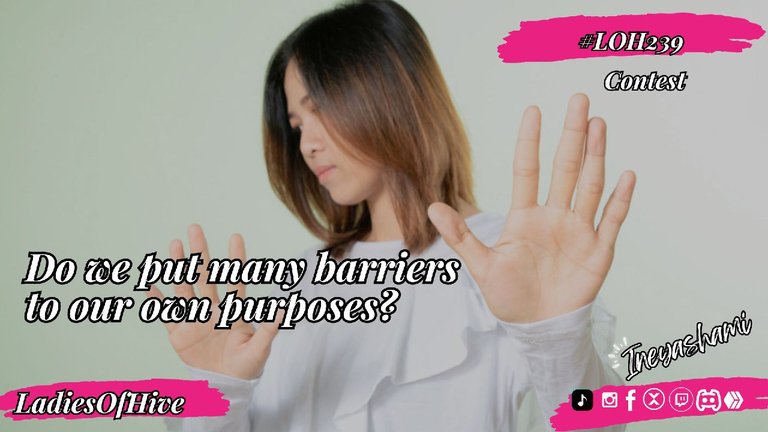
English
Something that is very true, and that @cautiva30 tells us, is that we come into this world with a purpose. Sometimes we are clear about it from the moment we are conscious, other times we are guided by those who raise us. Sometimes we discover it fleetingly or through a lesson, and finally, there will be those who will continue in the consecutive search for it. It is normal to ask ourselves again and again what we should do and why we were created, and as we continue to ask ourselves, we set goals and chart paths.
The thing is, we don't always know if we are on the right path, but we know when our mind is undecided; We always know how to recognize that emotion of uncertainty and those feelings of discomfort, along with that little voice that makes us wonder again and again if we really want this the way it happens. Because we can't or won't know who we are 100 percent at first, we'll be doubting every moment. So, without realizing it, mental barriers or self-blocks due to doubt will appear.
When we set goals, we believe they'll be easy to achieve, and those that help us take small steps or clarify our vision will truly be. However, those that completely change our course to position it where it should be will be a sea of long, uncertain steps that sometimes make us pause and question ourselves. True goals are those that are difficult to achieve and that go hand in hand with those big but necessary changes to achieve our objective. Therefore, in this process, we don't even know when the barrier is external or self-imposed, and we must be aware of when we are only delaying instead of moving forward.

I've always talked about procrastination as something that always attacks us when we want to be active and consistent with our actions, from the daily ones to the internal ones, but thinking about it as something that could slow down our personal progress is something that crossed my mind while I was organizing my thoughts for this post. Then I thought about the following question you ask us, which brought up something very true: hearing someone tell us "it's for your own good" won't trigger the same reaction in everyone. We all know or will discover what truly feels good for us based on our emotions and experiences. So my question was: "Are these two questions linked?"
What would happen if the dreams we have now aren't compatible with our purpose or what we think of as our purpose? What if we really make excuses for our personal growth because we don't like what we currently have, no matter how stable and progressing it may be?
Yes, we certainly chart our own paths and are the masters of our happiness, deciding whether what we do is right, accepting the consequences or rewards. But one thing is certain: everything in this life is ever-changing, and perhaps the purpose we were born for, or the one we formed, at some point, turns out not to be the right one. Or, even if it was, we find one that, while not so good, completely fills us emotionally and gives us that peace of mind.

The fact is that excuses, indecision, and "buts" are nothing more than our mind and body's way of defending ourselves against what we don't know. Beyond that, they're a warning that it's not really what we want to do and that we need to redirect everything, even if we're already halfway there. In my case, looking back, many resolutions were formed along the way, grand, brilliant, and promising, but when I was there, I wasn't happy with them and I always found myself putting "buts" on so many things that it became clear I wasn't truly happy. And you know you're happy when you do things without fear and when you don't care about anything. And when I didn't feel that way, I decided to let go and keep searching until I found that right goal and mission.
This is my small contribution and how the questions proposed for this week resonated with me. I hope you enjoy it.
Thank you very much for reading.
Spanish
Algo que es muy cierto y que nos comenta @cautiva30 es que venimos a este mundo con un propósito; a veces desde que tenemos conciencia lo tenemos claro, en otras nos lo hacen saber con guías por parte de quienes nos crían, en ocasiones los descubriremos de forma efímera o a través de alguna lección y finalmente estarán los que se mantendrán en la búsqueda consecutiva de este, y es que es normal preguntarnos una y otra vez qué es aquello que debemos hacer y para qué fuimos creados y conforme nos vamos preguntando vamos haciendo metas y trazando caminos.
La cosa es que no siempre sabemos si estamos en el propósito correcto, pero sabemos cuando la mente está indecisa; siempre sabemos reconocer esa emoción de incertidumbre y esas sensaciones de incomodidad junto con esa vocesita que nos hace pensar una y otra vez si acaso queremos realmente esto de la forma en que pasa, ya que, debido a que no podemos o no sabremos cómo somos al 100 por ciento a la primera, estaremos dudando de cada ámino, por lo que, sin darnos cuenta, las barreras mentales o los autobloqueos por duda se harán presentes.
Cuando trazamos metas creemos que serán fáciles de lograr y en sí las que nos ayudan a dar pequeños pasos o a ir aclarando nuestra visión en verdad lo serán, pero aquellas que dan un giro completo a nuestro rumbo para posicionarlo en donde debe estar serán un mar de pasos largos y dudosos que nos harán a veces dar pausa y cuestionarnos, ya que las verdaderas metas son aquellas que cuestan cumplir y que van de la mano con esos cambios grandes pero necesarios para poder encontrar nuestro objetivo, por lo que en ese proceso incluso no sabemos cuándo la barrera es externa o autopuesta y deberemos ser conscientes de cuando solo atrasamos en vez de avanzar.

Siempre he hablado de la procrastinación como eso que siempre nos ataca cuando queremos ser activos y consecuentes con nuestras acciones, desde las diarias hasta las internas, pero pensar en esta como algo que pudiera hacer que nosotros mismos ralentizáramos nuestro progreso personal es algo que pasó por mi mente mientras ordenaba mis ideas para este post. Entonces pensé en la siguiente pregunta que nos hace, la cual dejó algo que es muy cierto, ya que al escuchar de tenereron decirnos ese "es por tu bien" no hará la misma reacción en todos, pues todos nosotros sabemos o descubriremos que es aquello que realmente nos hace bien en base a nuestras emociones y experiencias, por lo que mi duda formada fue: "¿Están ambas preguntas ligadas una a otra?"
¿Qué pasaría si los sueños que tenemos ahora no son compatibles con nuestro propósito o eso que pensamos como propósito? ¿Qué pasa si realmente le damos excusas a nuestro crecimiento personal porque no nos gusta lo que tenemos actualmente por más estable y en buen progreso que esté?
Sí, ciertamente nosotros trazamos nuestro camino y somos dueños de nuestra felicidad y decidimos si lo que hacemos está bien aceptando las consecuencias o recompensas, pero una cosa es cierta: todo en esta vida es cambiante y tal vez el propósito para el que nacimos o ese que fuimos formando, llegado a un punto, resulta no ser el correcto o, aunque lo fuera, nos encontramos con uno que, aunque no sea tan bueno, nos llena completamente en las emociones y nos da esa tranquilidad.

Y es que las excusas, la indecisión y los peros no son más que un modo de defensa de nuestra mente y cuerpo ante lo que no sabemos y más allá es una advertencia de que no es realmente lo que queremos hacer y que hay que redireccionar todo, aunque ya se esté a mitad del camino. En mi caso, viendo hacia atrás, muchos propósitos se formaron en mi camino, grandes, brillantes y prometedores, pero al estar allí no estaba conforme con eso y siempre ponía un pero a tantas cosas que daba a notar que realmente no era feliz. Y sabes que eres feliz cuando haces las cosas sin miedo y cuando no te importa nada y cuando no lo sentí así, decidí dejar eso e ir buscando hasta que logré encontrar esa meta y misión correcta.
Esta es mi pequeña participación y la forma en que las preguntas propuestas para esta semana conectaron conmigo, esperando sea de su agrado.
Muchas gracias por leer.



